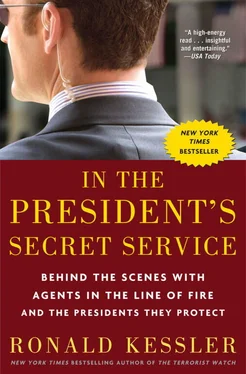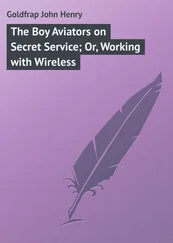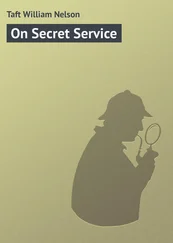But what about instances when the Secret Service buckles under pressure from campaign personnel or White House staff to let people into events without being screened? Suddenly, Trotta changes his story. “When we have a crowd of seventy thousand people, we may or may not need to put all those people through magnetometers,” Trotta says. “Because some of those people in certain areas might not have a line-of-sight threat that can harm the protectee.”
But what if an assassination occurred because someone was not screened? Trotta looks uncomfortable. Still, he plows on ahead, saying that a lot of factors come into play.
“The president can go to a sports arena or stadium and may stay in a box,” Trotta says. “Let’s say if he’s on the third base up in a box, the people on first base side, center field, they might not be the threat. But the people around him may be the threat. So now we screen that area, and the critical part is to make sure that there’s no handoff, so you have a dead space that is secure.”
Has Trotta never heard of a gunman leaving his seat to zip off a shot or throw a grenade at the president? When told of Trotta’s rationale for stopping magnetometer screening, Secret Service agents cannot believe he said what he did indeed say.
“I was in absolute shock regarding his comment about the mags closing down and potential attackers being too far away to cause any problems,” says an agent on one of the two major protective details. Imagine, the agent says, if three or four suicide assassins came in with guns firing.
“I cannot believe the head of our protective operations actually said that,” the agent says. “Yeah, let’s drop those magnetometers. Thank God you have it on record, because he would be one of the first people to be called to testify before a congressional committee if such an incident happened.”
“Saying not everyone in a seventy-thousand-person event is close enough to shoot the protectee is an amazing answer,” says another agent on one of the major protective details. “I’m embarrassed that an assistant director would give you that answer.”
Danny Defenbaugh, the former FBI agent who criticized the Secret Service’s decision to stop magnetometer screening at an Obama event in Dallas, notes that word can quickly spread that the agency engages in such lax practices.
“The people who want to assassinate the president will watch and look for the Secret Service to close down the magnetometers before an event starts,” he says.
Shutting down magnetometers as an event is about to start is shocking enough, but when Vice President Biden threw the opening pitch at the first Baltimore Orioles game of the season at Camden Yards on April 6, 2009, the Secret Service had not screened any of the more than forty thousand fans. Moreover, even though Biden’s appearance at the game was announced beforehand, the vice president was not wearing a bulletproof vest as he stood on the pitcher’s mound.
“A gunman or gunmen from anywhere in the stands could have gotten off multiple rounds before we could have gotten in the line of fire,” says a current agent who is outraged that the Secret Service would be so reckless. According to this agent, before the Baltimore event, senior management on Biden’s detail decided “We don’t need magnetometers,” overruling stunned agents on Biden’s detail and the agency’s Baltimore field office.
In addition to being vulnerable to assassination at the Orioles game, Biden sabotages his own security by insisting on having only two vehicles instead of eight in his Secret Service motorcade, especially when visiting Delaware. Nor does he want the usual police escort. “He doesn’t understand protection,” an agent says. “Our bosses have no backbone. Instead of folding, they should explain why protection is needed and insist that he have it.”
Biden’s lack of regard for security was evident when, chatting with journalists at the head table at the 2009 Gridiron Dinner, he revealed the location of a top-secret bunker beneath the vice president’s residence. Biden later tried to claim that he was talking about a study used by his predecessor Dick Cheney at the upper level of the residence. But the Secret Service emailed agents to warn them that Biden had compromised the location of the vice president’s secret underground bunker.
“It was a shock to all of us that the vice president did that,” says an agent. “If we had done that, we would have been prosecuted.”
Referring to the decision to dispense with magnetometer screening, an agent says, “The Secret Service has dismantled the first line of defense against an assassination. They can say it’s okay, but it will not be okay when the president or vice president is killed.”
As Trotta acknowledges, demands on the Secret Service have been exploding. Moreover, as presidents travel more, the Secret Service has to devote more resources to advance work. Near the end of his term, President Bush traveled somewhere almost every day. In 2008, he visited thirty countries.
In April 2008 alone, the Secret Service provided protection during trips to twenty countries on five continents. In that month, “We had all our protective assignments—the former presidents—and you had the Pope come in; you had heads of state coming into the U.S. because of the Pope’s trip,” Trotta says. “Then we had the Caribbean summit in Miami. You had the president’s North American summit in New Orleans. We had huge campaign rallies.”
Yet Trotta refuses to acknowledge that those demands have in any way diminished the level of protection, either as a result of magnetometer screening being waived or because overwhelmed, experienced agents are getting fed up and leaving. If agents are departing, it’s not the fault of Secret Service management practices, he says. Moreover, he says it’s fine if people leave.
Agents “look at travel, and they see the money they’re making, and it does come down sometimes to the quality of life,” Trotta tells me. “But the job is what it is. We have a responsibility to the American public, and it comes with sometimes a price: long hours, travel, missing birthday parties, and transfers. And it comes down to an employee saying, ‘I can’t do it anymore.’ So they choose. They just go. And that’s okay.”
When it comes to the agency’s weapons, Trotta is similarly indifferent. Trotta says he leaves those decisions to the training facility.
“They’re the experts,” he says.
Remarkably, the assistant director in charge of protecting the president and presidential candidates expresses no interest in the question of whether an assassination attempt could be successful because agents are not equipped with weapons that the FBI, the army, and even the Amtrak Police Department use.
In fact, says an agent, “When we go for firearms training, every one of our instructors implores us to ask in the evaluation forms we submit to switch to the M4. The MP5 is a big pistol. We are outgunned by our enemy.”
Trotta’s nonchalant attitude about whether Secret Service weapons are effective, about increasing agent turnover, and about the practice of skipping magnetometer screening reflects a culture of denial. The fact that Trotta would cite the effectiveness of magnetometers in preventing assassinations and say “everyone goes through the magnetometer,” and, in the next breath, defend skipping them at major events, is astounding.
In fact, it was such a decision to stop magnetometer screening that almost led to the assassination of President George W. Bush on May 10, 2005, when a man threw a grenade at him as he spoke at a rally in a public square in Tbilisi, Georgia. Because magnetometer screening was stopped, the man was able to take a grenade into the event where Bush was to speak.
Читать дальше












